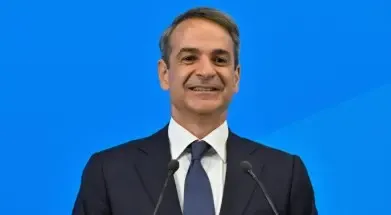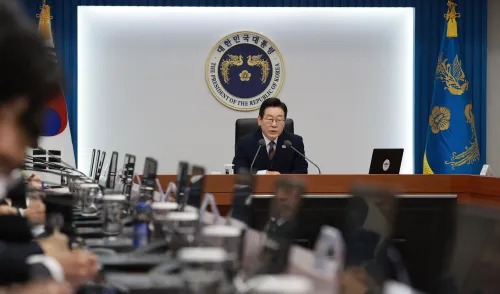Greek PM Aims for Third Term, Rejects Early Election Speculation

Synopsis
Key Takeaways
- Mitsotakis aims for a third term in office.
- Dismisses speculation about early elections.
- Focus on tax relief for the middle class.
- Recent economic initiatives include rental subsidies and pension support.
- Strong recovery post-Covid with significant growth rates.
Athens, April 24 (NationPress) Greek Prime Minister Kyriakos Mitsotakis has reiterated his desire to pursue a third term in office, dependent on maintaining public backing.
In a conversation with the "Direct" vidcast from the online news outlet protothema.gr, Mitsotakis on Wednesday rejected rumors about early elections or potential modifications to the electoral laws.
Looking forward to his policy speech at the Thessaloniki International Fair in September, the Prime Minister indicated that the government would prioritize further tax relief for the middle class, as reported by Xinhua.
He pointed to recent economic measures, such as rental subsidies and pension support, as illustrations of his administration's reform-driven agenda.
Mitsotakis first took office in 2019 with a significant majority and was re-elected in 2023.
This election marked the first in the EU nation's post-bailout phase, during a period when businesses and workers were struggling under the weight of heavy taxes imposed by Syriza to create a budget surplus required by international creditors.
Over the following four years, tax burdens were reduced, and while the Covid-19 pandemic severely impacted Greece's crucial tourism sector, the country has since made a robust recovery, achieving growth of 8.3 percent in 2021 and 5.9 percent last year.
This recovery was facilitated in part by over 57 billion euros ($62 billion) allocated by the government to mitigate the effects of the health crisis and inflation.
Mitsotakis also benefited from increased spending flexibility under the EU's more lenient pandemic-era regulations.
He has emphasized Greece's revitalized economic status in his re-election campaign, asserting that his conservative administration has reduced 50 taxes, enhanced national output by 29 billion euros, and led the most extensive infrastructure improvements since 1975.
This message has resonated well with voters who are fatigued by Greece's debt crisis characterized by job losses, rising expenses, and business bankruptcies.
While inflation continues to be a significant concern for voters, Alexis Tsipras of the leftist Syriza party has struggled to gain traction with calls for wage increases.
To many, he remains the Prime Minister who nearly led Greece out of the eurozone and the leader who abandoned a promise to end austerity to agree to harsher bailout conditions.









